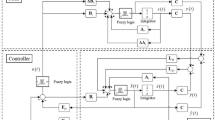Abstract
A class of nonlinear singularly perturbed systems can be approximated by the Fuzzy Singularly Perturbed Model (FSPM).This paper proposes a new direct adaptive controller on the basis of the FSPM. The aim is to make the states of the closed-loop system follow those of the reference model. The feedback gains of the controller can be adjusted on line; and we don’t require the parameters known in prior. Lyapunov constitute techniques are used to prove the stability of the closed loop systems. Finally the simulations illustrate the effectiveness of this approach.
Similar content being viewed by others
References
Z. Gajic and M.T. Lim, Optimal Control of Singularly Perturbed Linear Systems and Applications-High Accuracy Techniques, Marcel Dekker, Inc. New York, 2001.
J. H. Chow and P. V. Kokotovic, “A decomposition of near-optimum regulators for systems with slow and fast modes,” IEEE Trans. on Automatic Control, vol. 21, no. 5, pp.701–705, 1976.
X. Y. Zhang, H. Z. Jin, H. P. Zhang, G. B. Li, and M. Ji, “Robust sliding mode control for a class of uncertain nonlinear singularly perturbed systems,” Proc. of the 41st SICE Annual Conference, vol. 4, pp. 2616–2621, 2002.
H. P. Liu, F. C. Sun, and K. Z. He, “Survey of singularly perturbed control systems: theory and application,” Control Theory and Applications, vol. 20, no. 1, pp. 1–7, 2003.
J. J. E. Slotine and J. A. Coetsee, “Adaptive sliding controller synthesis for non-linear systems,” Int. J. Control, vol. 43, no. 6, pp. 1631–1651, 1986.
R. Langari and W. Li, “Analysis and efficient implementation of fuzzy logic control algorithms,” Annual Conference of the North American Fuzzy Information Processing Society — NAFIPS, New Frontiers in Fuzzy Logic and Soft Computing, pp. 1–4, 1996.
J. Lin and F. L. Lewis, “Fuzzy controller for flexible-link robot arm by reduced-order techniques,” IEE Proc.-Control Theory and Applications, vol. 147, no. 3, pp. 177–187, 2002.
H. P. Liu and F. C. Sun et al., “Controller design and stability analysis for fuzzy singularly perturbed systems,” Acta Automatic Sinica, vol. 29, no. 4, pp. 494–500, 2003.
H. P. Liu and F. C. Sun et al., “H 2 state feedback Control for fuzzy singularly perturbed systems,” Proc. of the 42nd IEEE conference on decision and control, Maul, Hawali, USA, pp. 5239–5243, 2003.
H. P. Liu and F. C. Sun et al., “Simultaneous stabilization for singularly perturbed systems via linear matrix inequalities,” Acta Automatic Sinica, vol. 30, no. 1, pp. 1–7, 2004.
W. Assawinchaichote, “H ∞ fuzzy control design for nonlinear singularly perturbed systems with pole placement constraints: an LMI approach,” IEEE Trans. on Syst, Man, And Cybern-Part B: Cybern, vol. 34, no. 1, pp. 579–588, 2004.
T. H. S. Li and K-J. Lin, “Stabilization of singularly perturbed fuzzy systems,” IEEE Trans. on Fuzzy Syst, vol. 12, no. 5, pp. 579–595, 2004.
K. Khorasani and P. V. Kokotovic, “Corrective feedback design for nonlinear systems with fast actuators,” IEEE Trans. on Automatic Control, vol. 31, no. 1, pp. 67–69, 1986.
G. Garcia, J. Daafouz, and J. Bernussou. “A LMI solution in the H2 optimal problem for singularly perturbed systems,” Proc of the American Control Conference, vol. 1, pp. 550–554, 1998.
E. Fridman, “Effects of small delays on stability of singularly perturbed systems,” Automatica, vol. 38, no. 5, pp. 897–902, 2002.
M. Nayeri, A. Alasty, and K. Daneshjou, “Neural optimal control of flexible spacecraft slew maneuver.” Acta Astronautica, vol. 55, no. 10, pp. 817–827, 2004.
Author information
Authors and Affiliations
Corresponding author
Additional information
Recommended by Editorial Board member Sergey Nersesov under the direction of Editor Young Il Lee. This work was jointly supported by the National Science Fund for Distinguished Young Scholars (Grant No: 60625304), by a grant from National Laboratory of Space Intelligent Control and by the Scholar Hunted Fund of Tianjin Normal University (No: 5RL072).
Li Li was born in Shandong Province, China, in 1978. She received her B.S. and M.S. degrees from Shandong Architecture Engineering College and Northwest Polytechnical University in 2000 and 2003, respectively, and her Ph.D. degree from the Department of Computer Science and Technology, Tsinghua University in 2008. She currently works in College of Computer and Information Engineering, Tianjin Normal University. Her research interests include intelligent control, fuzzy systems, and adaptive control.
Fuchun Sun was born in Jiangsu Province, China, in 1964. He received his B.S. and M.S. degrees from Naval Aeronautical Engineering Academy, Yantai, China, in 1986 and 1989, respectively, and his Ph.D. degree from the Department of Computer Science and Technology, Tsinghua University in 1998. He worked over four years for the Department of Automatic Control at Naval Aeronautical Engineering Academy. From 1998 to 2000 he was a Postdoctoral Fellow of the Department of Automation at Tsinghua University. Now he is a Professor in the Department of Computer Science and Technology, Tsinghua University. His research interests include intelligent control, networked control system and management, neural networks, fuzzy systems, nonlinear systems and robotics. He has authored or coauthored two books and over 100 papers which have appeared in various journals and conference proceedings.
Rights and permissions
About this article
Cite this article
Li, L., Sun, F. The direct adaptive control based on the singularly perturbed model with the unknown consequence parameters. Int. J. Control Autom. Syst. 8, 238–243 (2010). https://doi.org/10.1007/s12555-010-0208-6
Received:
Revised:
Accepted:
Published:
Issue Date:
DOI: https://doi.org/10.1007/s12555-010-0208-6




